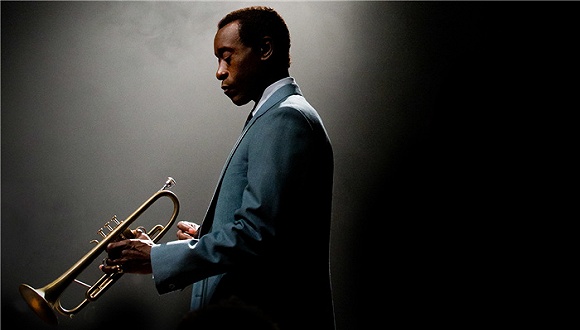Student: Oh! So his old style of jazz was actually a kind of product, one that had been developed pretty thoroughly.
學(xué)生:哦!所以邁爾斯舊的爵士風(fēng)格其實(shí)是某種產(chǎn)品,已經(jīng)開發(fā)得很徹底了。
And he'd taken it about as far as he could.
他也將之發(fā)展到力所能及的極致了。
So he decided to take a big risk and try something totally new.
所以他決定冒個(gè)大風(fēng)險(xiǎn),嘗試些全新的東西。
Professor: Exactly! Something completely fresh and cool.
教授:對(duì)!完全新鮮的,酷斃了的事物。
And people couldn't get enough of it.
人們?cè)趺绰牰悸牪粔颉?/p>
It was a brand new beginning that left lots of room for further development artistically.
這是一個(gè)全新的開始,從藝術(shù)角度來說,還有很多進(jìn)一步發(fā)展的空間。

And as a market analyst, you could say that with Kind of Blue, he was jumping to the beginning of a brand new S-curve! With all that potential for profitable development still ahead of him.
作為市場(chǎng)分析師,你可以說,有了《Kind of Blue》,他跳到了一個(gè)全新S曲線的開端,以后還有巨大的利潤增長潛力。
But let me ask you something else.
讓我問些別的問題。
This isn't just the music of a single performer, is it? George.
這不僅僅是一位演奏家的音樂,對(duì)吧,喬治?
Student: Hardly. More like a group of all-stars.
學(xué)生:不算是。更像全明星團(tuán)體。
Along with Miles Davis on trumpet, there is Bill Evans on piano, John Coltrane on tenor saxophone...
邁爾斯·戴維斯的小號(hào)之外,還有比爾·埃文斯彈鋼琴,約翰·柯川吹次中音薩克斯……
Professor: Individually perhaps the best in the business.
教授:就他們個(gè)人來說,都是業(yè)內(nèi)最頂尖的。
But thinking of Miles Davis as the leader of this group, how did he organize and manage all these incredible talent?
但把邁爾斯·戴維斯當(dāng)作這個(gè)團(tuán)隊(duì)的領(lǐng)導(dǎo)者來看,他是怎么組織和管理這些頂尖人才的?
Student: Well, he'd lay out the general outline, the theme and then give each of these star performers, one by one, the creative freedom to really show what they could do with it on their own instrument, to improvise and add something new, but always within the same general theme.
學(xué)生:他設(shè)下了總體大綱和主題,然后給每一位明星演奏家(每一個(gè))創(chuàng)作的自由,讓他們展示他們能用自己的樂器表演出什么,來即興創(chuàng)作和增加新元素,但總是要保持同一個(gè)總主題。
Professor: So Miles Davis gets credit for recruiting the best jazz talent anywhere and getting them to collaborate on a fantastic musical product.
教授:所以,邁爾斯·戴維斯因招募到了最棒的爵士音樂人才而受到廣泛好評(píng),他讓他們合作做出了一個(gè)極佳的音樂產(chǎn)品。
Everyone see the business parallels here?
大家都能看見商業(yè)中的相似之處了嗎?
And give each of these musicians credit for seizing this opportunity and creating great individual performances.
這些音樂家也因自己把握住了機(jī)會(huì),創(chuàng)造了精彩的個(gè)人表演而受到表揚(yáng)。
But good jazz is more than just outstanding individual performance, isn't it?
但好的爵士樂不僅僅是杰出的個(gè)人表演,對(duì)嗎?
Student: Definitely. Jazz musicians need to listen to each other and go with the flow.
學(xué)生:當(dāng)然。爵士音樂家需要互相聆聽,順勢(shì)而彈。
Like, one time somebody goofed and came in a little early, but everyone else adjusted and went right along with it, as if nothing were wrong.
比如,有一次某人出錯(cuò)了,(加入演奏時(shí))彈早了一些,但其他人都隨之調(diào)整,順著錯(cuò)誤來彈奏,仿佛沒有出任何差錯(cuò)。
And this mistake came out like just another unexpected creative interpretation.
這個(gè)錯(cuò)誤就變成了另一種出乎意料的創(chuàng)新演繹了。
Professor: Thanks. George.
教授:謝謝,喬治。
Great insights, ones that would certainly apply to what we are studying here.
你的見解很棒,也能應(yīng)用到我們所學(xué)的領(lǐng)域中來。
What are the main topics that the class discusses?
課堂討論的主要話題是什么?
What do the speakers indicate can be represented by the S-curve graph?
根據(jù)說話者,S曲線圖表能代表什么?
How did jazz fans react to Miles Davis' album Kind of Blue?
爵士樂迷對(duì)邁爾斯·戴維斯的專輯《Kind of Blue》有什么反應(yīng)?
Based on Miles Davis's approach to recording Kind of Blue, what does the professor imply managers should do in running a business?
基于邁爾斯·戴維斯錄制《Kind of Blue》的方法,教授暗示管理者在企業(yè)運(yùn)營中該怎么做?
What lesson can be learned from the example about a mistake during a musical performance?
從那個(gè)音樂表演出差錯(cuò)的例子中,我們能學(xué)到什么?
What is the professor encouraging the student to do when she says this 'Stay with me here.'?
當(dāng)教授說“留心聽”的時(shí)候,她想鼓勵(lì)學(xué)生能做什么?










